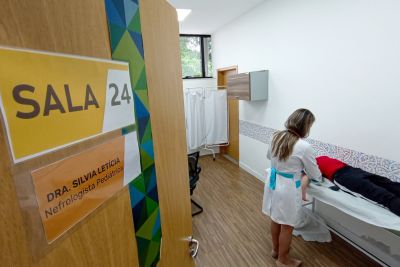Written by Palmer Barros (CIIR)
03/08/2024 at 10:54 pm
This ninth Saturday of this month is Nephrologist Day, but in the end, what is the medical specialty and when can we go for a consultation? By making kidney diseases accessible to the people of Pará on a daily basis, the Integrated Center for Integration and Rehabilitation (CIIR), in Belém, emphasizes the importance of surveillance that treats diseases that appear in adulthood, but which may begin in childhood, a group, some of which are diagnosed during pregnancy, making It requires follow-up in different specialties in addition to pediatric kidney diseases.
According to CIIR pediatric nephrologist, Sylvia Maus, the specialty works on diseases related to the kidneys and urinary tract, which may be related to both acquired diseases (infections) and congenital malformations, and the specialty aims at diagnosis, prevention and beyond. Everything, treat these diseases.
“Nephrology is the part of medicine that refers to the kidneys and urinary tract. In general, the kidneys promote the elimination of toxins in the blood through filtration; regulate blood production and bone maintenance; blood pressure; and control chemical and fluid balance.
The doctor explains that when this organ, for some reason, stops working normally, it becomes necessary to undergo evaluation with a specialist so that possible diseases can be diagnosed and treated early, to avoid irreversible losses to the kidneys, which are at risk of developing. To a chronic condition with complete loss of functions. He explained, “Kidney failure, called chronic kidney disease, leads to the patient being connected to a device that plays a similar role to the kidney, which is a procedure called dialysis.”
Sylvia Maus continues to highlight urinary tract kidney diseases that are monitored by other medical specialties such as pediatric urologists, pediatric cardiologists, pediatric rheumatologists, as well as neurosurgery and other health specialties such as dietitians.
During treatment at CIIR and during her return visit, eight-year-old Nuan Mora underwent tests that found crystals in her urine. “In cooperation with Dr. Sylvia, my daughter began prevention through follow-up. It is the beginning of the formation of kidney stones, but it is not serious yet, but it is a warning sign. To avoid reaching an alarming stage, it is recommended to consume water and follow a balanced diet, in addition to the use of medications.” Adds mother Jesine Mora, 44 years old.
Food-related risk factors that lead to urine crystals include excessive consumption of processed/processed foods, animal protein, and others.
“On the other hand, the diet-related factors that lead to a reduced risk of developing crystals, and therefore kidney stones, are to eat a balanced diet with fruits and vegetables and, above all, to avoid eating foods rich in ‘salt’ and to increase water intake,” advises the nephrologist. .
Sylvia Maus explains that crystals in urine form from supersaturation of certain substances that occurs when their concentration exceeds their solubility in urine.
“Although most people's urine is supersaturated with one or more types of crystals, there are crystallization inhibitors that prevent the continued formation of these elements. Therefore, medication is sometimes necessary, and follow-up with a nephrologist is necessary to do this responsibly. I stress Treatment also depends on the patient’s commitment to treatment.”
building – CIIR is a reference in PARA in providing medium and high complexity assistance to people with visual, physical, hearing and intellectual disabilities (PwDs). Users can access the center's services through referrals from health units, hosted by the organization center in each municipality, which in turn refers them to ISIS. The request will be analyzed according to the user profile by the State Regulatory System (SER).
service: CIIR is a body of the Government of Pará managed by the National Institute of Social and Human Development (INDSH), in partnership with the State Department of Public Health (Sespa). The center operates on the Arthur Bernardes Highway No. 1000 in Belem. For more information: (91) 4042-2157 /58 /59.

“Wannabe internet buff. Future teen idol. Hardcore zombie guru. Gamer. Avid creator. Entrepreneur. Bacon ninja.”

